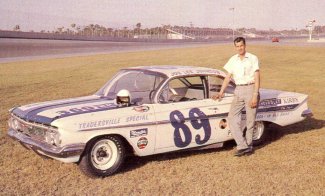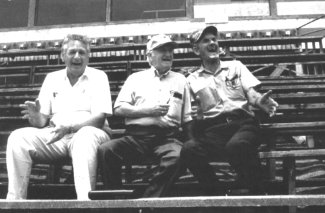
Joe Lee Johnson would compete at NASCAR's highest level for several years, winning the inaugural World 600 at Charlotte Motor Speedway in 1960, before becoming at track owner in Tennessee.
By Eddie Samples
Posted in Feature Stories 9/29/11
Joe Lee Johnson was a tall, quiet, unassuming man who seemed sure of himself.
While doing research on Atlanta’s Lakewood Speedway back in 1999, Sam Colvin, Kenny Bugg, Jimmy Mosteller and myself drove to Tennessee to visit with Joe Lee.
At the time, he owned an old fashioned quarter mile dirt speedway with wooden bleachers in Cleveland Tennessee, similar to what he raced on when he began his career in the early 1950s.
On June 6, 1954 at Lakewood, he won a race and nearly won many more there. The place also nearly killed him. He gave every top notch driver fits that raced against him, and he was victorious at many other southern tracks where he was a dominating force.
He began racing in Chattanooga at Alton Park and Warner Park Speedways. Born in Cowpens, South Carolina on Sept. 11, 1929, he moved to Tennessee and lived and maintained a garage close by these tracks.
We asked him which speedways he enjoyed the most.
“Well, I don’t remember exactly, but if I won them, than most likely that’s the ones I enjoyed the most,” he said. “But I never kept up with my wins and we never really had cameras and such. I went to win, not to worry about the publicity. I just went to win. A lot of them went to ride.”
Joe Lee asked if Lakewood Speedway was still around. We told him parts of it were, but mostly just the old grandstands. Mr. Mosteller then asked Joe Lee if he knew if was originally built as a horse track over 80 years ago.
“The hell you say,” Johnson said. “No, I never knew that, I would think a horse would fall out before he got around that thing, unless he was watered up good.”
Winning everywhere locally, by 1957 Johnson had elevated himself to the NASCAR circuit and by 1959, he had won their convertible series championship, a favorite division at the time.
In 1960, he won the first NASCAR World 600 at Charlotte Motor Speedway in the Grand National (now Sprint Cup) division, and seemed to be destined as one of racing’s all time greats.
Then the bottom fell out. Well, sort of. He quietly quit NASCAR early in the 1962 season.
Why? Mostly because of the death of his mechanic and car owner Paul McDuffie in a racing incident during the 1960 Southern 500, shortly after the duo’s victory at Charlotte.
The accident occurred when an out of control car slammed into the pits, killing McDuffie and two of his crewmen, along with a NASCAR official.
“Paul was my friend, not just my mechanic,” Johnson told us. “I was in the pits, looking out my rear view mirror, and if I had not pulled out when I did (for the crew to get back over the wall), it could have been even worse, if that was possible. After that, my heart just wasn’t there. I raced a couple more years in NASCAR, but like I said, my hears was not there.”
Johnson didn’t care to talk about the wreck, so Mr. Mosteller reminded Joe that he himself still had a Coca-Cola can at home with Joe Lee’s picture on it from winning the Charlotte race. Even then, big corporations were beginning to think racing.
“I believe they called the thing the Coca Cola World 600,” Johnson added. Joe also said he couldn’t believe Tony Stewart running at Indy in 1999, then running the 600 later that day at Charlotte.
“I know the cars are different today,” Johnson said. “You couldn’t have physically done that back in the sixties, but man, it was still something. I was dead tired after my win in running just the Charlotte race.”
When we asked him if there was any one particular driver that gave him the hardest test, he said, “Jack Smith, Billy Carden, Sonny Black, Bill Latham, Tommy Wells, Charlie Padgett, Wilbur Rakestraw. They were all tough. Really, any in the southeast were tough.”
Joe Lee said the southern drivers are what made Bill France, Sr., but up north there were many drivers that were outstanding too, such as Wally Campbell, Pepper Cunningham and later Iggy Katona.
“There were many more, I just can’t think that quick,” he added.
We asked him about his interest in promoting racing.

Sam Colvin (left) Jimmy Mosteller (center) and Joe Lee Johnson (right) share a few laughs at Cleveland Speedway in Tennessee in 1999. Photo courtesy Eddie Samples
“Well, youngsters in this small town of Cleveland, as any other place, are just as prone to have the need for some kind of outlet, but yet not the opportunity,” he said. “But you get a kid turning 16 and he or she gets restless. Well, this track provides a place to go, whether to participate or watch. And like a lot of other small tracks that dot the country today, it gives them a reason to stay out of trouble and in some cases make a good living.”
“Here at Cleveland Speedway, we’ve produced quite a few drivers that have graduated into the higher levels of competition,” he added. “Even make a living out of it. My son Ronnie won a couple of national dirt track championships in 1992 and ’94. And of course, Skip Arp got his start here.
“Plus, these kids learn how to drive out here instead of on the highways. We have a Cleveland Speedway Racing School we opened this year with two great race drivers/teachers in Dale McDowell of Rossville, Georgia and Rex Richey out of Ringgold, Georgia. It beats learning to drive between two tractor trailer trucks running down the interstate at 80 miles per hour.”
“We use a racer with a complete front seat and two steering wheels so these cars can be as safe as possible,” he continued. “Whether you come to learn to drive or acquire more about set-ups, or just want to have a good time, we can provide.”
Actually, Joe Lee himself raced periodically in local events since he left NASCAR in the early sixties, mostly for other owners at tracks such as the one he owned.
He bought the Cleveland facility in 1980 and was pretty much at home from there on. Each year, he held the “Jean Johnson Memorial Run” at the track in memory of his past wife, who died many years ago of illness. He quit racing himself a few years prior to the interview.
“I remember my son beating me one night,” he said. “After that, I figured I would hang it up. He was getting too good, and I wasn’t getting any younger.”
But some time later fate nearly did him in again, this time on the track.
“Someone had too much to drink after a race one night and climbed into a car, cranked it up and I guess was going to run a few laps,” Johnson said. “Well, the races were over and the track was crowded with spectators and thirteen people were injured. Thankfully, they all recovered, but that nearly shut us down.
“But thanks to all the local people here and the shrine temple’s great support we were able to open the gates one more time.”
“This is the grass roots of racing, it’s just one thing I truly love,” Joe Lee told us near the end of the interview. “This is the king of place I started driving, and I feel this is where I belong now. This is my home.”
Editor’s note: This article originally appeared in the September, 1999 edition of the Pioneer Pages magazine. Joe Lee Johnson passed away May 26, 2005.
Eddie Samples is a racing historian and writer, and is the son of champion stock car racer and Georgia Racing Hall of Famer Ed Samples.
Questions, comments, suggestions? Email us!
This website is not affiliated with or endorsed by the Georgia Racing Hall of Fame or the Georgia Auto Racing Hall of Fame Association, Inc. All content is the intellectual property of the individual authors. All opinions are those of the individual authors. Please do not repost images or text without permission.
